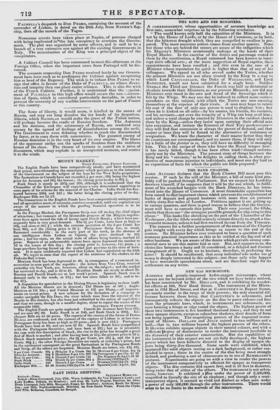THE KING AND HIS MINISTERS.
A CORRESPONDENT, whose opportunities of accurate kDOWledge aie first-rate, somewhat surprises us by the following revelation. "The world knows only half the calamities of the Ministers. It is not by the House oiLords or by the House of Commons, or by both,
that the bitterest draught Which they are compelled to swallow is pre-
pared. The most nauseous potion comes from another quarter. None but those who are behind the scenes are aware of the indignities which
his Majesty's Ministers occasionally undergo at the hands of their Royal Master. In the exercise of the duties and patronage vested in them by the constitution, a Royal command has been known to inter- rupt their official acts ; at the mere suggestion of Royal caprice, their
appointments have been recalled ; and this even in the case of a Minister whose reputation for spirit is higher than that of any of his
colleagues. We appeal to all who served under the Tories, whether
the present Ministers are not 'often treated by the King in a way to which Lord CASTLEREAGII, the Duke of WELLINGTON, and Lord BATHURST, would not have submitted for a single hour. Neither GEORGE the Third nor GEORGE the Fourth was half so dictatorial or absolute towards their Ministers, as our present Monarch ; nor did any Ministers ever stand in the awe and dread of the Sovereign which is felt by the Whigs. We may one day be induced to collect some curious anecdotes on this subject, .with which the. Tories are now amusing themselves at the expense of their rivals. 'A man may hope to retain his seat if the foot of only one person is used to displace him ; but when he is kicked on all sides—by his master, his friends, his enemies, and his servants—not even the tenacity of a Whig can long avail him ; and unless a total change be exacted by Ministers in the conduct shown them by the King—unless they insist upon carryinr, their official acts into execution, and imitate the firmness of their Tory predecessors— they will find that concession is always the parent of demand, and that sooner or later they will be forced to the alternative of resistance or resignation. We know the character of their master better than they do (continues our correspondent), and we assure them, if they will only try a little of the fortiter in re, they will have no difficulty in managing him. This is the recipe of those who know the Royal temper best : it has rarely failed, though it has been often tried—though unfortu- nately not by the Ministers. The present state of things between the King and his "servants," as he delights in calling them, is often pro- ductive of monstrous injustice to individuals, and must one day lead to an exposition of facts for which the public are little prepared."


















 Previous page
Previous page